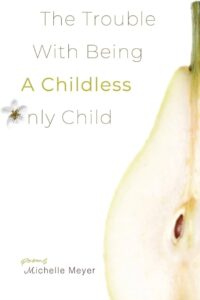
The Trouble With Being a Childless Only Child
ISBN: 978- 1960329288
2024, Cornerstone Press
$21.95, 104 pages, Paper
(sponsored post)
Reviewed by Jamie Lorenzen
In the opening stanza of the title poem of her second book of poems, Michelle Meyer’s ostensible trouble with being a childless only child regards whether her deceased mother will be remembered by anyone after the poet herself dies. Given that the 73-poem collection constitutes a progeny of remembrance, even Meyer herself notes in her Introduction that “these poems ensure the preservation of some things” about her mother that otherwise would be lost to time.
The real trouble keynoted in the title, then, may instead have to do with what Meyer writes in the second stanza, namely, how no one will ever know the visceral soundings of her private and black well of grief into which the rememberer nevertheless dips her poet’s pen after her mother’s death:
When I’m gone no one will ever know
that I stood here, at what is now my kitchen sink,
writing, worrying
over this newly discovered form of loss.
No one will ever know
This trouble has to do with Meyer’s venture to speak of the unspeakable vicissitudes of deeply personal loss that she now breathes, a suspiration that gainsays neither emitting shared giggles with her mother while eating onion rings nor expectorating sour grapes of their forever push-pull mother-daughter relationship.
Meyer takes seriously her poetic vocation, which (as Rilke and Kafka contend) advises the poet only to strive to speak the unspeakable, to put into words what indeed no one will ever fully know about another’s personal stew of raw rage, tender love and affection, pleasure, pain, laughter, loneliness, gratitude, contempt, praise, and judgment.
Her collection of poems not only intuitively draws from commonly known stages of grief (denial, anger, bargaining, depression, acceptance), but also shows how grief has a non-linear path of its own, how unexpected ephemeral moments of sweet solace are perhaps the most enduring and endearing gifts, and how any hint of clinical closure is akin to her mother’s love of “unrealistic romances” and “BS happy endings.” At the bark and growl of what Meyer calls “random memory,” grief instead spiralizes back on itself and, in recurrent iterations, “rips [her] apart” in her poem “Still Rabid,” while in the poem “Glutton,” she is lured “into second or third helpings” of grief when “torpedoed by an unasked-for memory.”
In as much as many of the poems attend to targeted aspects of grief, the choicest poems arguably allow for a wider picture of the arc of grief—poems that, as poet John Graber notes in his praise of Meyer’s collection, are simultaneously “painful dirges and celebratory wakes.” These poems test both poet’s and readers’ capacities to hold at the same time fraught, conflicting feelings of love between mother and daughter, all the while remaining in the fissure of grief that the rememberer’s testimony requires of writer and reader.
Meanwhile, the hard truth remains that those lived moments are Meyer’s only and forever, even as she depicts them in her poetry. As the last line of the second stanza of her title poem maintains, no one can ever fully know of those moments wherein the poet stands quite alone at her own “kitchen sink,/writing, worrying/over this newly discovered loss. No one will ever know” [end of stanza; no full stop]
An accomplished practitioner of enjambment, however, Meyer’s No one will ever know forwards the poem laconically into the third and fourth stanzas, turning such impossibility of knowing into at least the possibility of a brief clutch of knowing for the reader:
…No one will ever know
that before this discovery I was preparing
to make pear sauce
out of pears that I picked from my neighbor’s tree
while listening to an interview with the artist
Dario Robleto who believes that
love survives the death of cells
which would mean we’re good for now because
your hands, your glowing blue molars, your laugh, your cells
are here
in my cells, and I’m alive, and
I love you—but
And despite this but that ushers in the poem’s concluding stanzas, which returns to whether her mother ever will be remembered (no BS happy ending here), Meyer may be satisfied in knowing that her collection of poems may just say the unsayable enough to affirm that the remembered, the rememberer, and even readers of this book of poetry are all, as she writes, good for now.
Published in Cider Press Review, Volume 26, Issue 5.
See all items about Jamie Lorenzen
Visit Jamie Lorenzen’s contributors page.
See all items about Michelle Meyer
Visit Michelle Meyer’s contributors page.


 Jamie Lorentzen is the author of several books and essays on Kierkegaard, Melville, and Bob Dylan.
Jamie Lorentzen is the author of several books and essays on Kierkegaard, Melville, and Bob Dylan. Michelle Meyer is the author of The Book of She (2021) and
Michelle Meyer is the author of The Book of She (2021) and 


